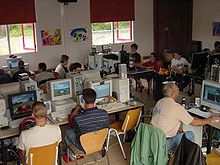History of video games/Etiquette
Timeline
[edit | edit source]Gaming Etiquette has evolved over time, often in response to emerging technology and game trends.
1980's
[edit | edit source]United States Arcades
[edit | edit source]I got next.—Common arcade phrase indicating one wants a turn.[1] Good etiquette sometimes, bad etiquette others.
1980's arcade etiquette in the United States of America encouraged modesty, good sportsmanship, and respect of skill.[2][3]
During the 1980's the practice of leaving a quarter on a machine emerged, a polite non-intrusive way to let a gamer know that someone wanted to have a go at the game they were playing was to put quarters on the machine deck.[4] The number of quarters either indicated the desired play time for a solo gamer waiting, or in the case of Coin Lining the number of people waiting in line if multiple people were waiting, typically only putting down one coin each in that case.[4][5]
1990's
[edit | edit source]United States Arcades
[edit | edit source]In 1995 some American arcades had for etiquette surrounding fighting games, including the quarters on cabinet signal morphing into a way to challenge a player to a match on a fighting game.[6][7]
Networked Computer Gaming
[edit | edit source]By 1994 the term gg ("Good Game") stated to be used online to genuinely and efficiently congratulate players at the end of a game, with the release of StarCraft popularizing the term.[8][9] By 1999 and in increasing frequency as time went on GG would start to be used as an insult, often in at the beginning or the middle of a match, and this has lead to the development of variations such as GGWP ("Good Game Well Played").[8][9] In general, l337 speak finds its way into online gaming communities.[10]
Fragging and rage-quitting are practices that predate video games, though Quake II's ability to call out any player that rage-quits mid-match likely helped popularize the term among gamers.[11][12]
2000's
[edit | edit source]
The proliferation of portable electronics and online communications during the 2000's created new etiquette questions.[13][14] One example is the proliferation of griefing, with many players having experienced this breach of etiquette by the late 2000's.[15]
2010's
[edit | edit source]Arcades
[edit | edit source]Common Arcade rules in the 2010's included not being overly drunk (Particularly for barcades), and good sportsmanship.[16]
For barcades with free play it is expected that gamers buy a drink to support the establishment, whether the drink is alcohol or a non-alcoholic does not matter.[1]
2020's
[edit | edit source]Animal Crossing etiquette
[edit | edit source]During the COVID-19 pandemic etiquette in 2020 Animal Crossing: New Horizons was covered by a number of media sources, and recommendations were generally made not to make major changes without asking the host.[17][18]
References
[edit | edit source]- ↑ a b "Arcade Etiquette". CityBeat Cincinnati. Retrieved 18 November 2020.
- ↑ "80s Arcade Gaming Rules of Etiquette - What NOT To Do - Communal News". Retrieved 18 November 2020.
- ↑ Grundhauser, Eric (4 May 2016). "How to be Cool (According to a Video Game Magazine From 1982)". Atlas Obscura. Retrieved 18 November 2020.
- ↑ a b "Arcade etiquette in the 80's?". Museum of the Game® Forums. Retrieved 18 November 2020.
- ↑ "Urban Dictionary: coin line". Urban Dictionary. Retrieved 18 November 2020.
- ↑ "Play Games! Get Paid!". Wired. Retrieved 18 November 2020.
- ↑ "26 Ridiculous Things Everyone Forgets About Arcade Gaming". TheGamer. 25 October 2018. Retrieved 18 November 2020.
- ↑ a b Paez, Danny. "How friendly gamer slang became the most sarcastic insult on the internet". Inverse. Retrieved 25 November 2020.
- ↑ a b Vicente, Vann. "What Does "GG" Mean, and How Do You Use It?". How-To Geek. Retrieved 25 November 2020.
- ↑ "A Leet Primer" (in en). www.ecommercetimes.com. https://www.ecommercetimes.com/story/47607.html.
- ↑ Paez, Danny. "How "rage quit" became the most relatable gamer emotion". Inverse. Retrieved 25 November 2020.
- ↑ December 2013, Zach Betka 02. "Lol noob, do you even know where video game terms come from?". gamesradar. Retrieved 25 November 2020.
- ↑ "Manners For A High-Tech Society - ExtremeTech". www.extremetech.com. Retrieved 28 November 2020.
- ↑ "My xbox LIVE etiquette manifesto thingy • Gaming • Xbox 360 • Eurogamer.net". Eurogamer.net. Retrieved 28 November 2020.
- ↑ Rubin, Victoria L.; Camm, Sarah C. (1 January 2013). "Deception in video games: examining varieties of griefing". Online Information Review. 37 (3): 369–387. doi:10.1108/OIR-10-2011-0181. ISSN 1468-4527. Retrieved 4 December 2020.
- ↑ "The Written Rules Of The Arcade". Arcade Heroes. 29 September 2016. Retrieved 18 November 2020.
- ↑ Farokhmanesh, Megan (20 March 2020). "A guide to Animal Crossing: New Horizons etiquette, or how not to be "a total tool"". The Verge. Retrieved 25 November 2020.
- ↑ Favis, Elise. "Animal Crossing etiquette guide: The dos and don'ts of online multiplayer". Washington Post. Retrieved 25 November 2020.